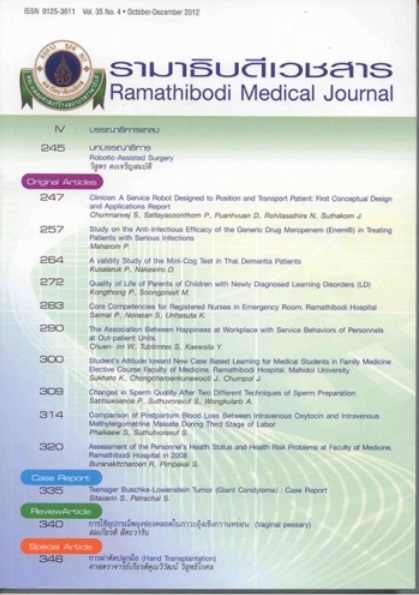Student's Attitude toward New Case Based Learning for Medical Students in Family Medicine Elective Course Faculty of Medicine, Ramathibodi Hospital, Mahidol University
Keywords:
New case based learning, Medical students, Student's attitudeAbstract
Background: Emerging literature identifies a shift towards student centered learning in a variety formats. In Family Medicine Elective Clerkship, Faculty of Medicine, Ramathibodi Hospital, the new case based learning strategy was implemented as a new session. The new case base learning reverses the traditional case based learning by 1) using the real case of patients those students saw in OPD and 2) shifting the role of students to take greater responsibility for the learning in the classroom.
Work done: Before the session, the 4th and 5th- year-medical student selected the real case that he saw in the practice during the elective period and then created a problem scenario from the case. In the session, the problem was progressively disclosed to his peers and the peers discussed the problem. At the end, the students summarized the learning points as take home messages.
Summary of results: The activity was evaluated by using information from students’ feedback and questionnaires. The 23 medical students participated in this new teaching session. The students appreciated it as a good activity and fell comfortable with it. Most of them developed greater understanding of the cases and approached the variety of cases under the collaborative environment.
Conclusion: We had success in establishing Case Based learning in elective course. Although the sample size is small, most of students in the course suggested the new session should be used as a teaching method for medical students in the regular course.
References
Roberts C, Lawson M, Newble D, Self A, Chan P. The introduction of large class problem-based learning into an undergraduate medical curriculum: an evaluation. Med Teach. 2005;27(6):527-33. doi:10.1080/01421590500136352.
Steele DJ, Medder JD, Turner P. A comparison of learning outcomes and attitudes in student- versus faculty-led problem-based learning: an experimental study. Med Educ. 2000;34(1):23-9. doi:10.1046/j.1365-2923.2000.00460.x.
Albanese MA, Mitchell S. Problem-based learning: a review of literature on its outcomes and implementation issues. Acad Med. 1993;68(1):52-81.
Topping KJ. The effectiveness of peer tutoring in further and higher education: A typology and review of the literature. Higher Educ. 1996;32(3):321-345. doi:10.1007/BF00138870.
Jamkar AV, Burdick W, Morahan P, Yemul VY, Sarmukadum, Singh G. Proposed model of case based learning for training undergraduate medical student in surgery. Indian J Surg. 2007;69(5):176-83. doi:10.1007/s12262-007-0016-2.
Dolmans DH, De Grave W, Wolfhagen IH, van der Vleuten CP. Problem-based learning: future challenges for educational practice and research. Med Educ. 2005;39(7):732-41. doi:10.1111/j.1365-2929.2005.02205.x.













